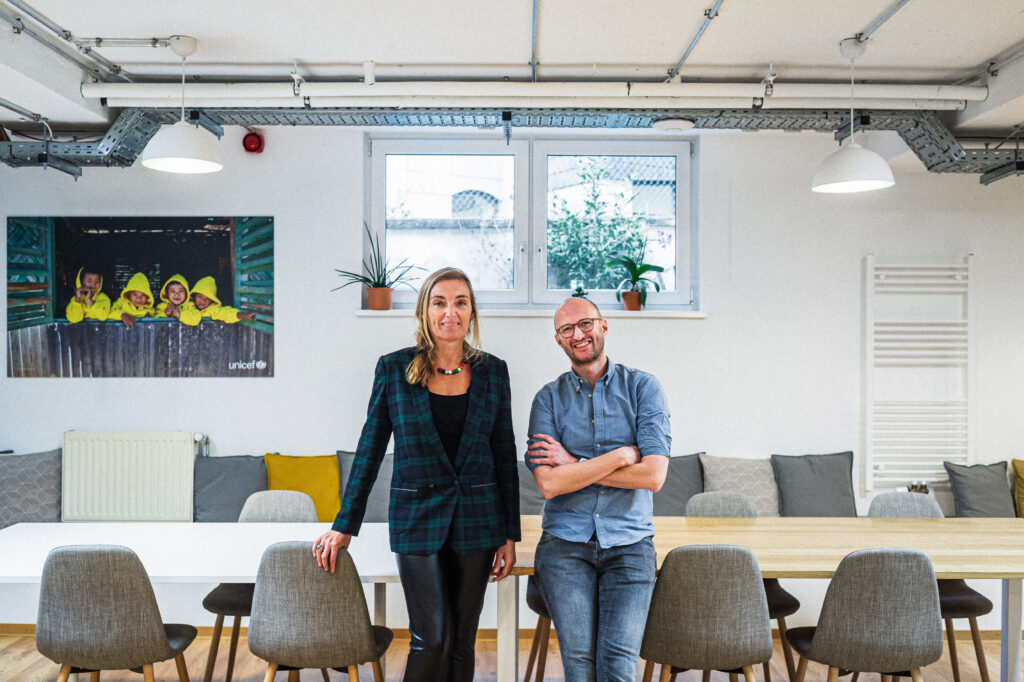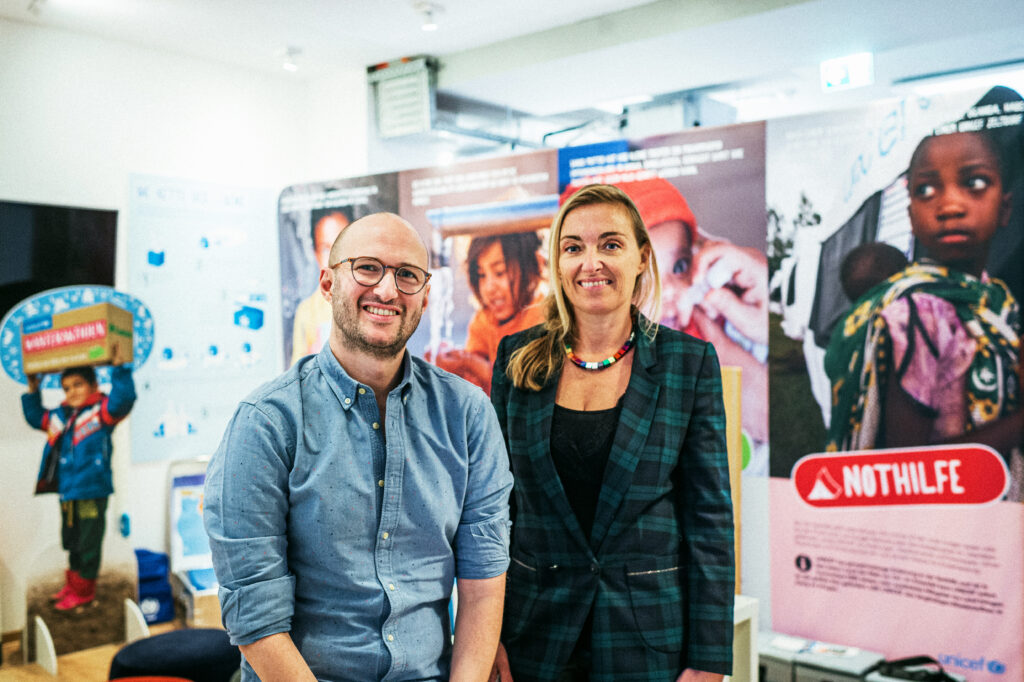Today, millions of children still receive little to no education, don’t have equal opportunities, and even more still lack access to clean water, nutrition, and healthcare.
To help improve this situation, Triodos Investment Management launched the Future Generations Fund. This fund offers investors the opportunity to invest in companies that improve the lives of children around the world. In collaboration with UNICEF, Triodos makes sure that children’s rights and welfare are included in the agendas of listed companies. UNICEF is not involved in the day-to-day investment decisions but acts as an important and valuable partner due to its expertise.
LFF sat down with Sandrine Clesse, Innovative Finance Officer at UNICEF Luxembourg, and Paul Heber, Chief of Communications at UNICEF Luxembourg, to talk about the Future Generations Fund and their involvement.
LFF: Recently, the Future Generations Fund was launched as an additional means to source funding for your programmes. How did the idea to partner with Triodos Investment Management to launch a new Luxembourg domiciled thematic fund come about?
Sandrine:
Our Innovative Finance Team carried out a performance analysis, examining overall performance, risk, and ESG rewards based on quantitative and qualitative data covering all Luxembourg registered UCITS funds classified as ESG funds. Once we had a clear overview, we compared and assessed the investment processes employed by the asset managers excelling in their respective asset class and geographical area.
Following this, we looked at the ESG and financial strategies of the top 20 funds. This narrowed down a list of eligible partners to less than 10 asset managers.
Once we had narrowed the field, we performed a due diligence check on Triodos Investment Managers to ensure they were aligned with our values and meet our criteria. Triodos then developed a strategy which led to the launch of the Triodos Future Generations Fund in March 2022.

Education is also vital in preparing children for the future. Therefore, the fund invests into companies that provide (online) schooling, educational content, and childcare.
LFF: What are the funds’ specific objectives? Why do we need a fund like this? What are the main investment themes it focuses on?
Sandrine:
The Future Generations Fund is a pioneer fund which exclusively invests for the benefit of children, today and in the future. The fund invests in listed small and mid-cap companies contributing to the basic needs of children, as well as those who work towards helping them reach their full potential as adults. This includes areas that benefit children and adults alike, such as education, clean water, healthcare, and nutrition.
Assessing the impact a company makes on the lives of children is difficult to determine. Triodos IM, therefore, developed a unique social investment theme which focuses on child welfare and development in five key areas: child health and survival, protection from violence and exploitation, access to education, environment and climate, and equal opportunity and inclusion.
The fund ensures that each of these themes are accounted for in its investment approach.
Consider, for example, the food, hygiene, and household products sector. The fund invests in companies that provide these types of products and services to children; specifically, companies that have considerable exposure to emerging markets, given the need and challenged in terms of sourcing these products in many of these countries.
Education is also vital in preparing children for the future. Therefore, the fund invests into companies that provide (online) schooling, educational content, and childcare. In the same vein, the fund also provides financing for tech companies that enable and support telecom firms in emerging countries. These firms are crucial in providing access to education.
Another important aspect relating to the fund’s investments is the protection of children from violence and exploitation, which are often linked to child labour and other forms of abuse. Cyber security is a good example of a concrete product or service concerning this aspect. Online abuse has been a growing concern, especially on social media. This fund therefore invests as well in companies that provide online protection tools.

Another important aspect relating to the fund’s investments is the protection of children from violence and exploitation, which are often linked to child labour and other forms of abuse.

LFF: How are the ESG criteria related to children’s welfare monitored by the asset manager?
Sandrine:
Firstly, companies offering viable solutions for the transition to a sustainable economy are identified via a combination of data on SDG contribution and a qualitative assessment. A company could, for example, contribute to SDG 4 ‘Quality Education’ but if this concerns only adult education, it does not fit the fund’s purpose.
Secondly, it’s essential they do no harm. This is ensured via screening the destructive and exploitative industries (e.g. fossil energy extracting companies, arms manufacturers, etc.) and making sure to exclude products such as weapons, nuclear, tobacco, gambling, petrol, oil, gas, coal, or other extraction, unsustainable cotton, fur or leather, and fishery products that do not comply with international standards.
Other exclusions are process related, such as violations of conventions on labour and human rights, environment, the WHO Code of Marketing of Breast-Milk Substitutes, and corporate governance, or precautionary, entailing the exclusion from companies in sectors with increased sustainability risks.
Finally, the integrated impact is appraised by assessing company ESG practices and sustainability policies.
The fund manager also conducts an integrated financial and sustainability analysis on each prospective investment, focusing on the potential impact of internal and external sustainability factors on a company’s future financial value. The approach is both solutions-oriented and forward-looking. The actual portfolio construction is based on a comprehensive impact, risk and return analysis.
LFF: Triodos IM donates 0,1 % of the NAV per year to support a UNICEF programme in Ivory Coast. What are the main goals of this initiative?
Paul:
This project addresses a couple challenges at the same time, namely plastic pollution, and access to education.
Abidjan, one of the most densely populated cities of the Ivory Coast, produces 288 tons of plastic waste per day, of which only 5% are recycled. Additionally, improper waste management is responsible for 60% of malaria, diarrhoea, and pneumonia.
The second major challenge is the nearly 2 million children who don’t have the opportunity to attend school to receive proper education. Together with a partner, we found a solution that turns plastic waste into bricks, which are then used to build classrooms. With only a hammer required they allow for a much faster construction, reducing construction time to just a few weeks instead of 6 months on average.
In addition, the bricks are 20% lighter and more durable than conventional bricks. They are waterproof, fire retardant, well insulated, wind resistant and are considerably cheaper in maintenance. Thanks to this revolutionary concept, many more children in Ivory Coast will receive an education and 10,000 jobs have been created. As it’s mostly the women who are gathering plastic waste, this leads to their empowerment and gives them a fair wage. Additionally, the schools will also provide access to water and sanitary facilities.

Thanks to this revolutionary concept, many more children in Ivory Coast will receive an education and 10,000 jobs have been created.


